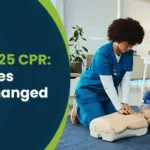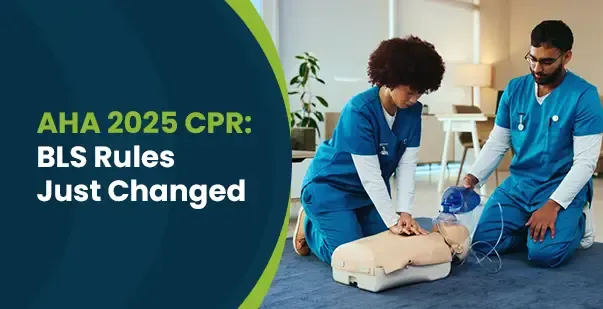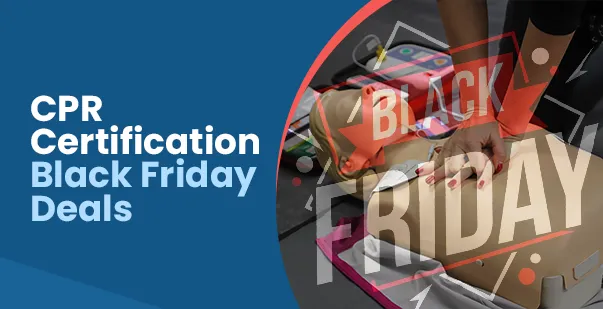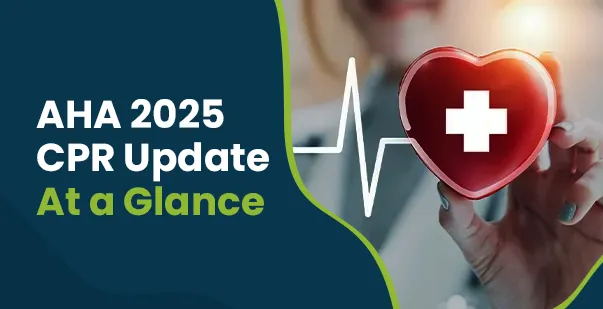Learning CPR for nurses is a super important skill because it helps them respond quickly when someone’s heart or breathing stops. Nurses with the right CPR certification are ready to save lives when emergencies happen.
Did you know that around 475,000 people die each year in the U.S. from cardiac arrest? This really shows how important it is for nurses to have CPR training and to keep learning about the latest CPR methods.
Nurses are key players in healthcare. Having the right CPR certification, like Basic Life Support (BLS) or Healthcare Provider CPR, helps them do their job well. The type of certification a nurse needs can depend on where they work and what kind of care they provide.
This article talks about what certifications nurses need, and why it’s important to keep learning so they’re always ready for an emergency.
What are the Levels of CPR Certification?
For nurses, it is essential to understand the various levels of CPR certifications. This ensures that the nurse is adequately prepared to handle emergencies.
There are a few key CPR certification levels nurses should be aware of. These levels instruct particular techniques to manage heart as well as respiratory failures.
Let’s go through these levels one by one.
1. Basic Life Support (BLS)
Basic Life Support (BLS) is a super important skill nurses use to help patients who are having trouble breathing, their heart stops, or if they’re choking.
Nurses do things like CPR, use a machine called an AED to give shocks, and help clear airways when someone is choking.
BLS helps nurses give care right away before doctors or more help arrives, and it can really make a difference in saving lives.
2. Healthcare Provider CPR
If you’re a nurse working in places like nursing homes, it’s important to get your Healthcare Provider CPR certification.
This training teaches you how to do basic CPR, like chest compressions and rescue breaths, but without the advanced airway techniques.
The certification usually lasts for two years. Keeping it up-to-date is really important so you’re always ready if an emergency happens at work.
3. Advanced Cardiovascular Life Support (ACLS)
ACLS is all about helping people with serious heart problems, like when their heart stops or beats in a weird way. Nurses get special training to handle these emergencies.
It builds on what they already know from Basic Life Support but teaches more advanced stuff, like how to clear a person’s airway, give medicine, and use a defibrillator.
This kind of training helps nurses do their best in tough situations and can make a big difference in how patients recover.
4. Pediatric Advanced Life Support (PALS)
PALS is a special training that helps nurses and other healthcare workers learn how to take care of sick or injured kids. It teaches them how to handle breathing problems, heart issues, and other emergencies.
Nurses also learn the right ways to help children who need quick treatment, like doing CPR or using special equipment for their airways.
With PALS, nurses are ready to help kids who are in a life-threatening situation and make sure they get the right care right away.
Get Certified with Our Online CPR Certification Course?
Learn CPR skills that make a real difference.
CPR Certification for First-Year Nursing Students
First-year nursing students have to get certain certifications to be ready for their clinical work and taking care of patients. These certifications usually include:
- Standard First Aid Training
- Basic Life Support (BLS) Certification
- Airway Management and Oxygen Therapy
- Mask Fit Testing
Let us analyze these certifications point by point:
1. Standard First Aid Training
Standard First Aid training is super important for nursing students in their first year. It teaches them how to handle common emergencies like cuts, burns, broken bones, poisoning, and accidents.
Learning these skills helps nursing students react quickly and confidently when something happens, making them ready to help until doctors or other professionals arrive.
Let’s say someone in the clinic gets a deep cut. A nurse who’s had this training can stop the bleeding by putting pressure on it, clean it up, and get the person ready for more treatment. This shows the nurse knows exactly what to do and can help keep the patient safe in an emergency.
2. Basic Life Support (BLS) Certification
Getting a Basic Life Support certification is super important for nurses. It teaches them what to do in tough situations like heart attacks or breathing problems.
With BLS, nurses learn how to do CPR well, use an Automated External Defibrillator (AED), and handle choking. This can really help save lives.
For nurses, having BLS certification isn’t just something they need for their job; it’s also a must for taking care of patients. It gives them the skills and confidence to act fast when things get serious, making sure patients get the best care possible.
3. Airway Management and Oxygen Therapy
Airway management and oxygen therapy are really important skills for nurses. They help keep patients breathing well and get the right amount of oxygen. When it comes to airway management, nurses make sure the airway is clear so the patient can breathe easily. They use tools like oropharyngeal and nasopharyngeal airways, especially for patients who aren’t fully awake.
Oxygen therapy is all about giving extra oxygen to patients who have trouble breathing or aren’t getting enough oxygen. Nurses figure out if someone needs oxygen, pick the right delivery method like nasal tubes or face masks, and keep an eye on how the patient responds.
Getting oxygen therapy right is really important to avoid issues like too much oxygen or problems with carbon dioxide.
4. Mask Fit Testing
Mask fit testing is an important part of nursing education. It helps students learn how to properly wear personal protective equipment (PPE), like N95 masks, to keep themselves and their patients safe.
The test checks if the mask fits correctly, ensuring it creates a tight seal and stops germs from getting through. During fit testing, nursing students practice putting on and taking off their masks the right way.
This training helps them feel more confident when using PPE during their clinical work and makes sure they’re following safety rules.
Now, let’s discuss the certification for second or third-year nursing students.
CPR Certification for Second or Third-Year Nursing Students
As a second or third-year nursing student, it’s super important to keep your CPR certification up to date if you want to take part in clinical rotations.
Many nursing programs won’t let you start clinicals unless you’ve already completed a CPR course. For instance, some programs say that sophomore, junior, and senior students need to be CPR-certified before entering clinicals.
CPR certifications usually last for two years, so if yours is about to expire, it’s a good idea to renew it quickly. Thankfully, renewing is pretty easy and doesn’t take much time.
Read More: CPR Certification for Florida Nurses and Nursing Assistants
Ongoing CPR Education for Practicing Nurses
Keeping up with CPR training is really important for nurses.
Sure, the first time they learn CPR gives them the basics, but practicing it regularly helps nurses stay sharp. Without keeping up with their skills, nurses might forget some steps or feel unsure when they actually need to use it. This could make a difference in how well they handle an emergency.
Let’s say a nurse learned CPR two years ago. Without any refresher courses, they might get confused or not be as quick when there’s an emergency. Taking refresher classes helps nurses stay up to date with new techniques and rules. They’ll be ready to help when it counts.
When nurses keep practicing CPR, it also makes the whole healthcare team stronger. Nurses who feel confident about their CPR skills help patients stay safe and can increase the chances of someone surviving a heart emergency.
So basically, it’s not just about improving one person’s skills, it’s about making the whole team better.
Importance of CPR Certification
CPR training is super important for nurses because it teaches them how to handle heart and breathing emergencies. When nurses know CPR, they can help save lives and keep patients safe during tough situations. Here are some reasons why CPR certification is important for them:
1. Immediate Response to Emergencies
Having a CPR certification is often the first one to help when someone has an emergency, like a heart attack or trouble breathing. When someone’s heart stops, every second matters, and nurses need to know what to do fast.
Having CPR certification teaches nurses the right steps to take during those urgent times. If they perform CPR the right way, they can help get a person’s heart beating again or keep blood flowing to important organs until more advanced help comes.
This quick action can really make a difference in whether someone survives or recovers from a serious situation.
2. Enhanced Patient Outcomes
Being certified in CPR is a crucial skill, as it greatly improves patient survival chances during cardiac emergencies. Immediate CPR can double or even triple the likelihood of survival after cardiac arrest.
A study that looked at 79 different research papers found that people who got CPR from someone nearby were four times more likely to survive compared to those who didn’t get it.
These findings show just how important it is for nurses to be trained in CPR. It helps them jump into action quickly, giving patients the best chance for a good outcome.
3. Professional Development and Career Advancement
Getting CPR certified is a big boost for a nurse’s career. Lots of hospitals and clinics make it a must for their staff so that everyone is ready if there’s an emergency.
Having this certification shows that the nurse cares about taking care of patients and wants to keep learning.
It can also help nurses move up in their careers and land jobs in places like emergency rooms, intensive care units, and other important medical areas.
4. Legal and Ethical Responsibility
Nurses have a responsibility to help people in emergencies, even if they don’t know them. This is because nurses are trained to care for others, and it’s part of their job to do what’s best for people in need.
When someone’s in trouble, nurses need to step in and help right away, no matter who they are or if there’s an official doctor-patient relationship.
This is something that the law and healthcare rules recognize, and it’s all about giving quick and caring help when it’s most needed.
5. Confidence and Preparedness
Getting regular CPR training helps nurses feel more confident and ready when emergencies happen.
Nurses who practice CPR often say they feel sure of themselves, which helps them do a better job when it counts. Being confident is key, because it makes nurses take action quickly and gives patients a better chance.
When nurses keep up with their training, they stay updated on the newest techniques, making them even more prepared for tough situations.
Learn CPR. Save Lives. Get Certified Online.
Master essential CPR techniques and get certified today.
Make Sure You Have the Right CPR Training as a Nurse
Having the right CPR certification is super important for nurses, especially when things get intense in emergencies. Most nurses go for Basic Life Support (BLS), but if they’re in certain jobs, they might also need certifications like ACLS or PALS. It’s key for nurses to stay on top of their training and renew their certifications to keep up with new skills. When nurses stay certified, they’re not just doing what’s required—they feel more confident and can handle tough situations better, which helps their patients and makes them even better at their job.
Read More: Washington State CPR Certification Online
FAQs
What CPR certification do nurses need?
Nurses usually need Basic Life Support (BLS) certification, which teaches important life-saving skills for adults, kids, and babies. If a nurse works in certain areas, they might also need Advanced Cardiovascular Life Support (ACLS) or Pediatric Advanced Life Support (PALS).
How often do nurses need to renew their CPR certification?
CPR certifications like BLS, ACLS, and PALS last for about two years. Nurses need to renew them before they expire to keep up with healthcare rules.
Can nurses take CPR courses online?
Some CPR classes have online parts, but nurses still need to practice things like chest compressions and using an AED in person. It’s really important to practice hands-on to get good at it.
Are there CPR certification requirements for nursing students?
Yes, nursing students have to take courses like Standard First Aid and BLS before they start working with patients. These are basic skills they need to know.
Do CPR certification requirements vary by state or employer?
Yes, it’s true. Different states or hospitals might have their own CPR requirements. Nurses should check with their state board or hospital to make sure they are up to date.









